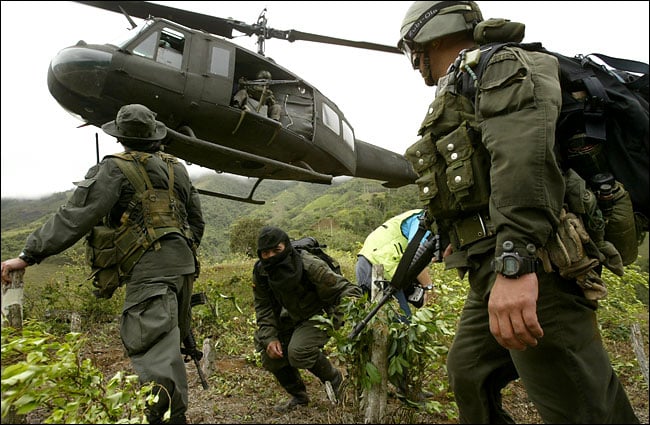(The Colombian Drug War) |
m (Chriswaterguy moved page War on drugs in columbia to War on drugs in Columbia) |
(No difference)
| |
Revision as of 00:51, 23 February 2016
The Colombian Drug War Since the 1970’s, Columbia has been home to an international for drug trafficking network, supplying countless countries with huge amount of both cocaine and marijuana. This enormous, multi-billion dollar industry began small, as a few independent cartels made and distributed their own product to their local neighborhoods. However, as time progressed, these organizations realized how lucrative the business truly was, which caused cartel and distribution centers to double and triple their profits by expanding the business, acquiescing new territories, and began employing hundreds of thousands of young Colombian men. Out of all these young new hires emerged one man- Pablo Escobar. He quickly shot up the cartel ranks and soon after earned the title as head of the Medellin cartel- the largest in all of Columbia. He terrified his country with power and violence as he sought to dominate both legal and illegal power, killing hundreds of government officials in hopes to take their positions. The country’s economy became depressed and unsustainable, as it became dependent on the money all this cocaine industry brought in. While the government and the police force made their strongest attempts to tear down the empire, they often found their own departments riddled with corrupt politicians or police officers- getting paid out by the enemy himself.
As the cartels became more powerful, it left the rest of the country scrambling with the aftermath of the violence and terror these cartels instilled. Young men no longer focused on going to school, and looked forward to going to college, but instead, they expected to join these violent gangs as a way to support their families. cocaine and drug dealing became a way of life for many people in the country, and remained that way until the early 1990’s. Eventually Columbia realised the issue was bigger than them, and the United States began to help intervene, especially since Columbia was smuggling up to 80% of the U.S. cocaine supply. After many years of strategic planning and making big moves, the countries together were able to help take down first the little cartels- leading p to the ultimate downfall of the Medellin family and pablo Escobar in 1993. As of today, the cartels are in too many factions and too diverse to ever hold the same reign they did decades ago. Since that time, the country has taken many attempts to reform their government and education systems, and are working hard to restore the once proud Colombian name.
Work Cited https://www.foreignaffairs.com/articles/bolivia/1988-09-01/colombia-and-war-drugs
